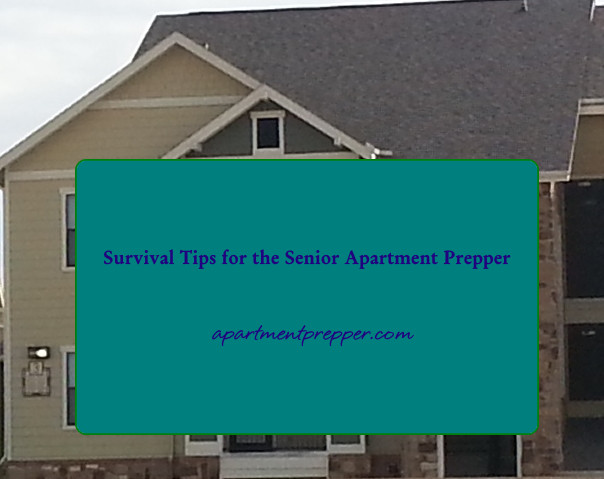This post is by Bernie Carr, apartmentprepper.com
I heard that one of my favorite aunts and her husband recently moved to an assisted living facility. They have a one bedroom unit in a complex that has medical personnel available to check on the residents periodically. One of the things she mentioned about her new abode is the small size, so storage is an issue just as it is with other apartment preppers. We have not discussed the subject of senior apartment preppers in this blog, so there is no time like the present!
I believe the basic preparedness tips are the same, but with some areas of focus.
Survival needs are the same for everyone
Water – have at least one gallon per person per day, for a minimum of one week.
Food – have a week’s worth of food for everyone in your household.
Shelter – have backup ways for lighting, as well as ways to heat your home such as blankets, propane heater etc.
Backup ways to cook food – A barbecue grill, propane stove, wood burning stove are good to have so you can continue to cook when the power is out
Sanitation – stock up on toilet paper, makeshift toilet
First Aid – keep a first aid kit well stocked
Security – Find ways to make your apartment more secure.
Emergency cash – In case ATMs and credit card processing is down, keep some cash at home for emergencies.
Areas of focus
What threats are you concerned about?
Consider the area where you live, and name all the threats that you are most likely to face. In Houston, the most common threat is hurricanes. With hurricanes come flooding and power outages. In the summer, there is also the threat of extreme heat and resulting power outages when the grid is overwhelmed. Don’t forget every day threats such as crime. All too often, criminals target senior citizens, thinking that they are frail and unable to fight back. Fortunately, many seniors are armed and do fight back, so that is part of the preparedness plan right there.
Be realistic about mobility
My Mom now has to use a wheelchair so this is a personal subject for me. There is always the perpetual question of whether to bug in or bug out. It would not make sense to be planning to trek out of the city on foot if getting around is a problem. Even without mobility issues, the most likely choice is to shelter in place or “bug in.” Unless it is a complete SHTF situation where infrastructure has fallen, bugging in is more advantageous as you would have all your preps in the comfort of your own home.
Stockpile medicines
I advise everyone of all ages who takes prescription medicines to include them in your first aid kit.
- Buy from a bulk pharmacy. Many insurance companies give you access to online bulk pharmacies that fill prescriptions with 2-3 month supply.
- Ask your doctor for an extra refill or two. Our primary care physician was willing to provide a written prescription to order certain medications online at a Canadian pharmacy as he was aware of the price difference.
- Update your first aid kit. Check expiration dates, and rotate your items. Also include current reading glasses, prescription glasses or contact lenses.
Have an emergency communication plan
Many families live miles away from each other, while some live close together. Whatever your situation is, have an emergency communication plan in place.
- Build a texting tree.
- Make a written back up your contact phone numbers from your cell phone.
- Have a way to communicate such as a land line if cell towers are down.
Find like minded friends
There is strength in numbers, and when an emergency hits, it is good to have trusted friends and neighbors who can help each other out. Get to know your neighbors but be selective on who to trust. You may be able to find like minded individuals who have an interest in emergency preparedness within your church, neighborhood or community organization.
Skills are valuable
People who lived through The Great Depression or even the fifties and sixties were used to doing a lot of things themselves and therefore acquired skills. Some skills that can be shared include gardening, auto repair, knitting, crocheting, canning, raising animals etc. These skills are not as common these days but would come in handy during hard times. At the same time, skills acquired in your lifelong profession (doctor, dentist, engineer, pharmacist etc) are valuable and can be shared or taught if the situation warrants.
Although the prepper community is comprised by various age groups, it is united by one goal: being prepared to survive an emergency or disaster. Everyone has valuable experience and something to contribute – in this way we can all survive together.
Please share your tips!
This is by no means a comprehensive list. Are you a senior prepper, or have elderly members you are helping to prepare for emergencies? Please feel free to share your favorite tips in the comments below.
© Apartment Prepper 2017

